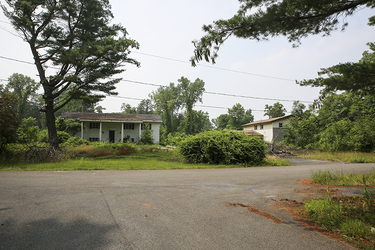Appeal heard: Can Pyramid acquire roads for Costco by eminent domain?
GUILDERLAND — Appeal arguments were heard this week as part of the fifth attempt to stop the Pyramid Management Group from building a Costco Wholesale along Western Avenue.
The lawsuit, filed by three of the petitioners involved in the four previous unsuccessful suits, seeks to annul the Guilderland Industrial Development Agency’s August 2023 decision allowing Pyramid to acquire by eminent domain the roads on the proposed Costco site, at the corner of at the corner of Western Avenue and Crossgates Mall Road.
The suit was filed in September 2023 by Westmere residents Thomas and Lisa Hart — she is currently a member of the committee updating Guilderland’s comprehensive land-use plan — and by 1667 Western Ave., LLC, a Stewart’s Shop (the company is not party to the suit), against the Guilderland IDA, the town itself, and three residential property owners in the ghost neighborhood.
Houses in the neighborhood adjoining Crossgates Mall were secretly bought up by Pyramid years ago and most of them are now vacant.
On Monday, attorneys for both parties made their cases in Albany to the five justices of the state Supreme Court’s Third Appellate Division. The Appellate division is the middle level in the state’s three-tiered court system.
James Bacon, the attorney for the Harts and 1667 Western Ave., LLC, argued that the IDA did not have the requisite authority to condemn public lands without approval from the New York State Legislature, and cited case law that the land still had public use.
The attorney for the IDA, Charles Malcomb, countered that the Harts and 1667 Western Ave. had no claims against the IDA regarding its authority to condemn the roads because they did not challenge the abandonment determination made by the town’s highway superintendent within the window to do so, a four-month period following the decision.
Malcomb argued that the petitioners lacked the standing, a party's legal right to bring a case or challenge an action in court, because they weren’t the owners of the condemned roads. But Bacon, citing case law, countered that the Harts did have standing because they used the public streets for recreation.
Bacon argued that Costco, as a “members-only” retailer did not serve a public purpose. But Malcomb said Costco constituted a legitimate public purpose because of the economic benefits it would provide in the form of new jobs, sales-tax revenue, and infrastructure improvements.
When questioned by the court on the “members-only” nature of Costco and whether it undermines the public-purpose argument, Malcomb argued Costco’s membership model was just another type of retail and did not negate the public-use argument.
Bacon argued Pyramid had a self-created hardship, a factor taken into consideration by a governing body, in this instance the IDA, when making a determination on a request: the company secretly bought up the houses in the neighborhood and deliberately allowed them to deteriorate, then used the resulting blight as justification for the condemnation, he said.
That claim was countered with changes made to the town’s zoning law — the creation of a transit-oriented district — that rendered the residential properties non-conforming as well as a disfavored use, which justified the condemnation.
No timeline was given for a decision.


